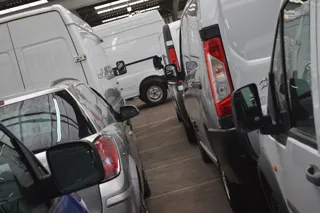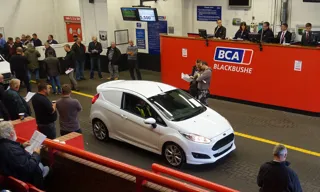 Andy Picton, chief commercial vehicle editor, Glass’s (part of Autovista Group)
Andy Picton, chief commercial vehicle editor, Glass’s (part of Autovista Group)
The UK’s light commercial vehicle (LCV) market declined 22.2% in November, with registrations for the month at their lowest since 2013 and 13.4% below the five-year pre-pandemic average of 28,119 units.
There were 24,352 new registrations in November, down from 31,320 units twelve months ago. Of those, 8.1% or 1,974 were battery electric vehicles (BEVs).
Year-to-date (YTD) registrations of 260,314 units is 20.1% down on the same point in 2021. YTD battery electric vehicle (BEV) registrations stand at 15,039 units and make up 5.8% of the overall LCV market. This figure is up 46.5% on 2021.
Compared with November 2021, all van sectors recorded declines in registrations. Vans below 2.0 tonne sector fell 70.9%, vans between 2.0-2.5t gross vehicle weight (GVW) declined 63.5%, whilst vans in the 2.5-3.5 tonne sector – which made up 75.4% of all vans registered in the month - recorded a 17.9% drop. The pickup sector returned a 26.1% increase.
Looking at specific model ranges, Ford took the top three places, with the Transit Custom, Transit and Ranger, respectively. The Ford Transit Connect was tenth with 733 units registered. The Mercedes-Benz Sprinter claimed fourth spot, whilst the Volkswagen Transporter and Crafter models claimed fifth and ninth positions.
The Vauxhall Vivaro was sixth, whilst seventh and eighth position went to the Renault duo of Master and Trafic. The Vauxhall Vivaro Electric remains the best-selling electric van with 496 units registered in November and 3,750 units registered YTD.
Top five LCV registrations
|
YTD 2022 |
November 2022 |
November 2021 |
|||
|
Ford Transit Custom |
39,486 |
Ford Transit Custom |
3,459 |
Ford Transit Custom |
5,809 |
|
Ford Transit |
30,732 |
Ford Transit |
3,218 |
Ford Transit |
3,203 |
|
Vauxhall Vivaro |
15,718 |
Ford Ranger |
2,193 |
Mercedes-Benz Sprinter |
1,857 |
|
Ford Ranger |
15,593 |
Mercedes-Benz Sprinter |
1,826 |
Vauxhall Vivaro |
1,371 |
|
Mercedes-Benz Sprinter |
15,077 |
Volkswagen Transporter |
1,583 |
Volkswagen Transporter |
1,325 |
Despite strong order books for 2022, the supply of LCVs has been a real problem all year.
Rising costs and component shortages have affected the volume of new vehicles into the UK market for well over a year, making the original 2022 SMMT forecast of 363,000 units completely unrealistic.
Each of the four quarterly forecasts has seen further downward realignments with the latest to 290,000 units missed as well, unless over 29,500 vehicles are registered in December.
UK van registrations remain a fifth down on the same point last year, highlighting the current difficulties in the marketplace.
Expectations are for a level of recovery in 2023, but with energy and raw material costs continually on the increase and shortages of some components still causing problems, a full recovery of the new LCV market still remains some way off.
Used LCV market overview
The last three years has seen the industry deal with the pandemic and now an energy and raw materials crisis, increasing the demand for used vehicles over the same period.
With the reduction of new vehicles in the marketplace, fleets have had to hang on to their vehicles for longer, reducing the flow of vehicles into the used market.
The resulting deficit in new registrations will likely mean that the wholesale market will struggle for three-year-old stock over the next three years.
The super-heated used market of the last 12-24 months is likely to be replaced by a softening of residual values in 2023 and more in line with the current economic situation.
November in detail
Glass’s data shows that the overall number of vehicles sold at auction increased by 1.95% versus October, but was 4.63% lower than the same point twelve months ago.
The most popular sector was medium van accounting for 38.25% of all auction sales, whilst stock in the 4x4 sector attracted the strongest average sales prices - £13,800. This figure is £400 lower than October.
The average age of vehicles sold during November decreased by 1.8 months to 77.1 months.
The average mileage reduced to 81,339 miles from 82,541 in October and is over 2,000 miles more than twelve months ago.
Vehicles in the large panel van sector unsurprisingly covered more miles than in any other sector, now averaging 90,581 miles. First time conversion rates for November remain steady at 79.0%.
The small van sector returned the best conversion rate at 82% (down 2.0% on October), whilst the weakest performing was the large panel van sector at 74.3%.
Used vehicles observed for sale in the wholesale market over the last month has remained relatively static, with volumes increasing by only 0.43% to nearly 40,700 units.
Just over 47.5% of all vehicles on sale were valued at £20,000 or more, whilst 36.1% were on sale for between £20,000 and £10,000.
At the lower end of the market, volumes have increased slightly with 13.2% of all vehicles on sale for between £10,000 and £5,000. Those on sale for less than £5,000 reduced slightly to 3.9% of the overall market.
Glass’s continues to monitor the LCV market closely and has an open dialogue with auction houses, manufacturers, leasing and rental companies, independent traders and dealers as well as the main industry bodies.
This information, combined with the wealth of knowledge in our CV team ensures Glass’s valuations remain relevant in the marketplace.




















Login to comment
Comments
No comments have been made yet.